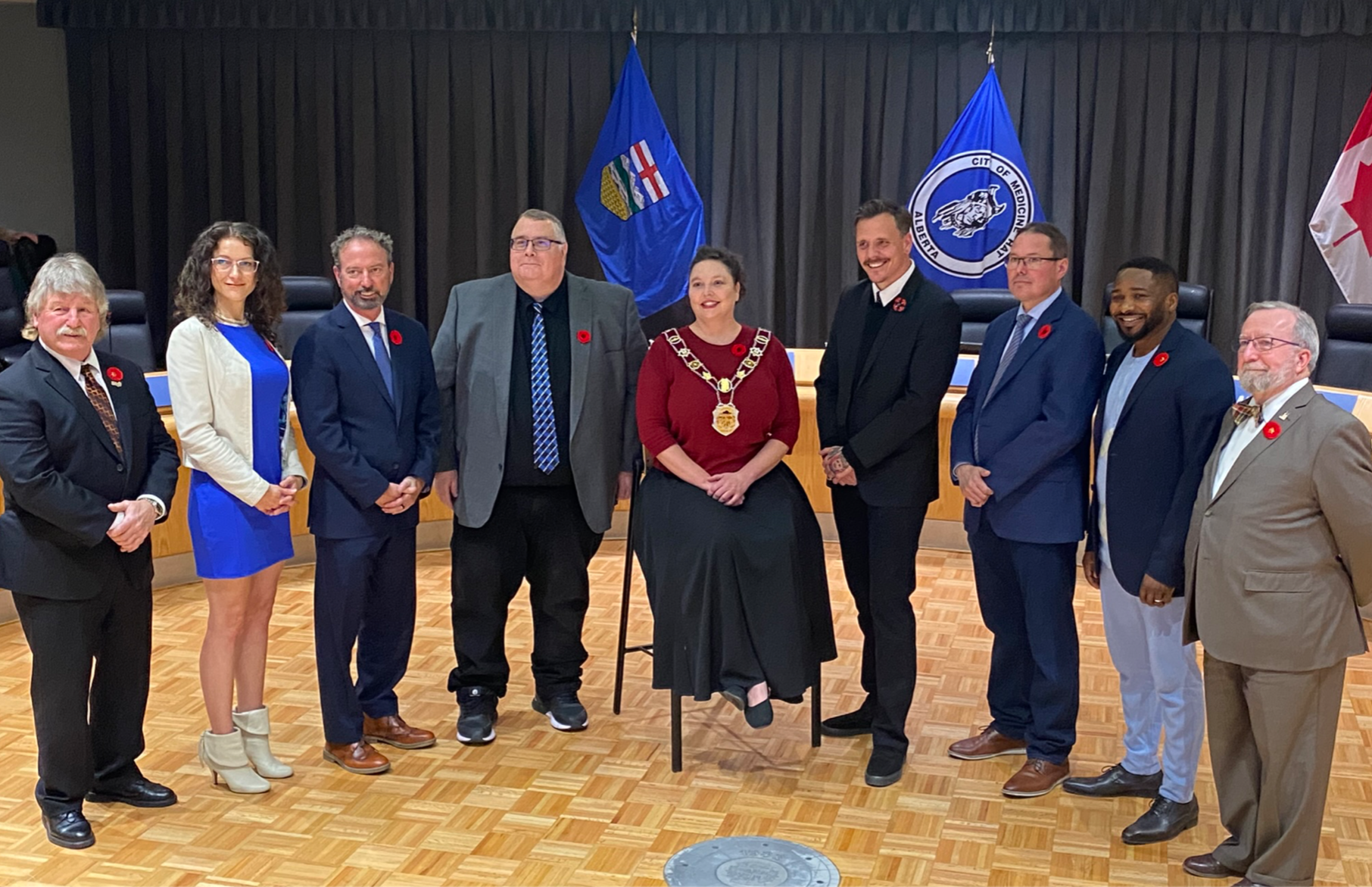New Medicine Hat Council's First Test: Navigating Utility Finances in 2026 Budget Discussions
Nov 3 2025 Inaugural organizational meeting - photo credit Kelly Allard Owl News
L-R Councillors Brian Varga, Cheryl Phaff, Ted Clugston, Dan Reynish, Mayor Linnsie Clark, Councillors Stuart Young, Chris Hellman, Yusuf Mohammed, Bill Cocks
MEDICINE HAT – A completely reconfigured Medicine Hat City Council will be immediately confronted with the city's severe financial reality during its first business meeting Monday, with a high-stakes preview of the 2026 budget that must address massive deficits and an eventual debate over the role of its public utilities.
The November 10 meeting will be the first substantive gathering for the new council since the October 20 election saw all 3 incumbent councillors running for re-election defeated. (Robert Dumanowski, Alison Van Dyke and Shill Sharps ran for council, Andy McGrogan ran for mayor.) Re-elected Mayor Linnsie Clark leads a council that includes three former members: Bill Cocks, Brian Varga, and former Mayor Ted Clugston, who lost to Clark in 2021 by a margin of nearly 3-1. Clugston’s return marks possibly the first time a former mayor has been elected to serve as a councillor.
The central item on the agenda is the 2026 Budget Council Introduction, featuring presentations from city administrators. This will be the new council's first official look at the financial challenges they must solve, most notably the city's gas division, which is running a deficit of nearly $18 million annually.
The financial crisis is set against the backdrop of a scathing provincial municipal inspection report published earlier this year, which found the city was being run in an "improper, irregular and improvident manner." Critics are concerned about how this council will break from the past. The 'experience' some are counting on is tied to the administration that oversaw the emergence of these deep-seated problems.
The issue of the city's electrical utility is politically charged; in 2023, a massive public outcry over the city billing customers at high market rates forced council to rebate approximately $33 million to residents and implement a stable, regulated rate of 7-11 cents/kWh, which remains in effect today.
Adding to this pressure is a growing public demand to remove the Municipal Consent and Access Fee (MCAF) from electrical bills. However, eliminating this revenue stream would create a significant budget shortfall that would force the city to find the money elsewhere, likely resulting in increases to other fees or property taxes, or necessitating cuts to municipal services.
Council must now grapple with the core question of whether to treat the electrical utility as a business to maximize profits or as a public service to keep rates low, a decision with major implications for taxpayers. This comes as the utility faces significant upcoming costs, including a recurring multi-million dollar bill for a "hot section" overhaul on its turbine engines, required every 25,000 hours of operation—equivalent to roughly 2 years and 10 months of continuous use.
These costs are volatile and have proven difficult to budget for. In 2024, city staff have had to return to council to request additional funds exceeding $4 million after repair facilities discovered more extensive damage to the turbine hot section than initially anticipated, resulting in significant budget amendments after the fact.
Compounding these issues is a fundamental shift in the city's fiscal model. For years, the city has relied on using its financial reserves to bridge the budget gap instead of implementing significant tax increases. This strategy is not sustainable, and with reserves steadily depleting, the new council will be forced to make difficult decisions about revenue generation and service levels that previous councils have deferred. This has resulted in maintenance being deferred and buildings such as Crestwood Pool and the Moose Arena to be allowed to fall into such disrepair that they were closed until the 2021 council authorized the required repairs and reopened them. With gas revenues collapsing, the pressure on the electrical utility to generate profit is immense, setting the stage for a difficult future policy debate.
The budget presentation, which is for information only and will not involve a vote, will be led by:
Jaret Dickie, Manager of Corporate Planning and Performance, and Aaron Hoimyr, Supervisor, Accounting, Corporate Planning and Performance.
Travis Tuchscherer, Director of Energy Marketing and Business Analysis.
The meeting begins at 6:30 PM at City Hall and is open to the public. You can attend in person at City Hall in Council Chambers or watch the meeting on the city’s YouTube channel. Owl News will also be streaming it on our Youtube channel.


